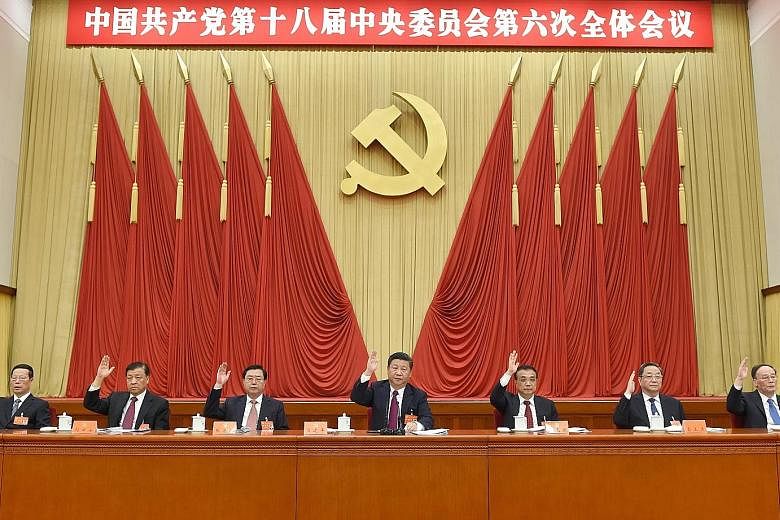The Chinese Communist Party (CCP) has, for the first time, declared President Xi Jinping the "core" of its leadership, an anointment that will allow him to shape the power play ahead of a leadership reshuffle next year.
A communique released after the party's Central Committee closed its annual meeting yesterday had the phrase "the central leadership with Comrade Xi Jinping as its core".
Being named the CCP's "core" - he xin in Chinese - puts Mr Xi, the party's general secretary since late 2012, on the same pedestal as Mao Zedong, Deng Xiaoping and former president Jiang Zemin.
While some consider it a formality given how quickly Mr Xi has consolidated his power base since taking power, analysts say the elevation is still politically significant.
First, it will strengthen Mr Xi's hand in dictating personnel appointments at next year's 19th Party Congress, when five of the seven Politburo Standing Committee (PSC) members and a third of the 25-member Politburo are set to step down after hitting the unofficial retirement age of 68 years.
"It has strengthened Xi's hand in shuffling the deck of cards leading to the party congress," Professor Yang Dali, faculty director of the University of Chicago Centre in Beijing, told The Straits Times.
Public administration expert Liu Junsheng of the China University of Political Science and Law said that as "core" leader, which implies that his authority should not be questioned, Mr Xi is likely to be less tolerant of opposition.
"With these two words, he xin, Xi will be able to or be compelled to take action against rivals, something he couldn't do previously," Professor Liu said.
The "core leader" title started shortly after the Tiananmen Incident in 1989 when Deng described Mao, himself and Mr Jiang as the nucleus of their respective generations. Deng's aim was to empower Mr Jiang, who had just been appointed CCP chief amid a national crisis.
Talk first surfaced late last year that Mr Xi would be named "core" leader after provincial party chiefs referred to him thus. Stronger signs emerged this month after CCP media called for his elevation.
But analysts say Mr Xi would have had to overcome challenges, given fears within the party that having a "core" leader could end the collective leadership framework put in place by Deng. Such fears could explain why the communique, which summed up key outcomes of the sixth plenum of the Central Committee, went on at length about how the collective leadership framework would continue.
"No group or individual is allowed to oppose this framework under any circumstances and any reasons," it said.
Prof Liu said that even as "core" leader, Mr Xi might still have to contend with resistance from political factions or from retired party leaders.
"The CCP may have issued a public call for members to rally around Xi, but the response may be different in reality," he added.

